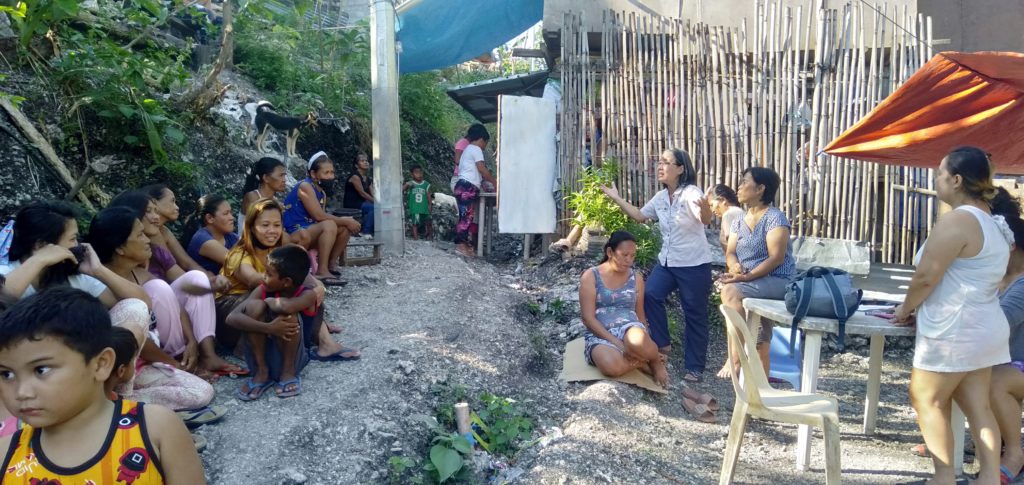September 2014 to March 2015
The Visayas Primary Healthcare Services, Inc. (VPHCS) implemented a project that benefitted families affected by Typhoon Yolanda in the northern part of Cebu.
The project, “Integrating Community Resiliency Model (CRM) in Community-based Health Program (CBHP) in ten villages in northern Cebu affected by Typhoon Yolanda was implemented on September 2014 to March 2015.
It was funded by the Unitarian Universalist Service Committee (UUSC), a human rights organization based in Massachusettes, U.S.A. and working in more than a dozen countries worldwide. UUSC fosters social justice and advances human rights, partnering with those who confront unjust power structures and mobilizing to challenge oppressive policies.
The six-month project addressed the mental health in the ten communities through application of the Community Resiliency Model (CRM) so that the residents can help themselves and help others as well.
The ten communities included Barangays Patao, Lipayran and Kampinganon, Municipality of Bantayan, Barangay San Augustin, Municipality of Madridejos, Barangays Baterya, Malbago and Tominhao in the Municipality of Daanbantayan, Barangay North Poblacion, Municipality of San Francisco, Barangay Cagcagan, Municipality of Puro and Barangay Puertobello, Municipality of Tudela.
The CRM embodies a community-oriented approach that promotes independence, education about the biology of the human body and how it responds to traumatic events and most importantly, how to restore or enhance resiliency. CRM aims to “make the skills a part of healing in daily life, to increase a sense of one’s ability to help him/herself, to learn how to bring the body, mind and spirit into greater balance and to encourage people to pass the skills along to friends and loved ones.”
The ten barangays are all coastal communities where residents are poor fisherfolks and small farmers whose houses were severely damaged by Typhoon Yolanda and their means of livelihood were totally lost. Even before Yolanda struck, the residents were already facing dire hardships to eke a living to feed their families. Yolanda aggravated their sufferings.
The ten barangays were among the 20 barangays which were served by the VPHCS during a previous project from February 2014 – April 2014, “Building resilient communities in facing natural calamities – Phase I,” implemented by the Central Visayas Farmers Development Center (FARDEC) with the support of ActionAid, an international non-government organization. The VPHCS provided psychosocial services to survivors of the typhoon, as part of the relief, shelter, livelihood and rehabilitation services in the project. It also organized people’s organizations including formation of working committees on disaster preparedness.
In the ten barangays were residents who showed signs of mental stress and psychosocial trauma that needed to have continued psychosocial intervention.
The project provided trainings of community health workers in the ten communities that enabled them to have basic CRM skills to help their residents return back to resiliency, recover from any trauma and promote their mental health.
It aimed to develop “trauma-informed” and “resiliency-informed” communities in the ten barangays where residents share a common understanding of the impact of trauma on the nervous system and how resiliency can be restored using this skills-based approach.
Prior to the community trainings, a training on CRM was conducted for 15 VPHCS staff and volunteers on October 17 – 19 andNovember 8 -9, 2014, in the Institute of Religion and Culture, Cebu City. Resource persons included three nurses trained on CRM and members of the Philippine Association of Community Resiliency Model Trainers (PhilACTs), namely, Edgar Gahisan, Lord Sidney Relon and Irish Grace Ramirez, and UUSC consultant Rainera Lucero.
Topics included an overview of CRM and the six skills of CRM, body mapping, tree of life, autonomic nervous system, language sensation, stress and traumatic moments. Workshops were conducted during the training in order for the staff members to understand and apply the skills among themselves.
As an outcome, 15 VPHCS staff and volunteers were trained on CRM. Furthermore, modules on CRM were then drafted by the trained staff members through workshops on Nov. 8 – 9, which were then discussed and approved by the body. The modules were then used during the community trainings. They are written in Cebuano. Powerpoints and other visual aids that were appropriate for the level of the community health workers were also made. A practicum of the basic three skills was also conducted after the module making.
Ten community trainings were conducted from November 2014 to February 2015. They were held in partnership and participation of the people’s organizations in all the barangays with their respective health committees and community health workers (CHWs) who attended the trainings. Ten CHWs in each barangay attended the trainings which were conducted by Irish Grace Ramirez, Pearl Templado, Tardy Guardiario, Lourdes Geolin and Lucila Carrreon of the VPHCS. Being active members of their organizations, the CHWs committed to use their CRM knowledge and skills to help their members.
At the start of each training, the participants introduced themselves with a partner and their challenging experience, this was then followed by a lecture discussion of the Community Resiliency Model. Within the discussions, workshops were also conducted.
Discussions on Community Resiliency Model for Children were also conducted, which were followed by the presentation of the body map earlier drawn by the participants. The cloth game was also introduced as one of the ways in identifying or tracking the sensations of the children.
After all the lectures, demonstrations and skills discussed, one-on-one return demonstration regarding how to perform and share CRM skills was conducted. They all performed well the CRM skills and were able to coach their own members while doing the return demonstrations of the skills.
As an outcome of the trainings, a total of 102 CHWs was trained who can use their CRM skills to help themselves and others.
Mentoring and monitoring of the trained health workers were done on February to March 2015 where they reviewed the CRM skills and shared their learning experiences using the skills.



